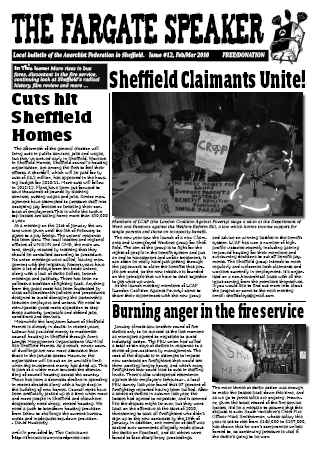The new year saw the launch of a new Claimants and Unemployed Workers group for Sheffield. The aim of the group is to fight for the rights of people in the benefit system and put an end to harassment and unfair treatment. It can often be really hard just getting through the paperwork to claim the benefits that people are owed, so the new intiative is founded on the principle that we have to stick together to get what we want.
At the launch meeting members of LCAP (London Coalition Against Poverty) came to share their experiences with the new group and advice on winning battles in the benefit system. LCAP has won a number of high-profile victories recently including gaining improved housing for their members and overturning decisions to cut off benefit payments. The Sheffield group intends to meet regularly and welcomes both claimants and workers currently in employment. It’s organised on a non-hierarchical basis with all the input coming from the members themselves. If you would like to find out more info about the project or come to the next meeting email:
 sheffdoleys@gmail.com
sheffdoleys@gmail.com CUTS HIT SHEFFIELD HOMES
The aftermath of the general election will bring cuts in public services, jobs and wages, but they’ve arrived early in Sheffield. Workers in Sheffield Homes, Sheffield council’s housing organisation, are among the first to feel their effects. A shortfall, which will be paid for by cuts of £4.2 million, has appeared in the housing budget for 2010/11. More cuts will follow in 2011/12. Plans have been put forward to save thousands of pounds by slashing services, cutting wages and jobs. Senior management have attempted to pressure staff into accepting pay freezes or breaking their contract of employment.This is while the twelve top bosses are taking home more than £50,000 a year.
At a meeting on the 21st of January the unions were given until the 5th of February to
agree to a pay freeze. The unions’ response has been slow. The local leaders and regional officers of UNISON and GMB, the main unions, simply reacted by insisting that they should be consulted according to procedure. No union meetings were called, leaving mangement with the initiative. Recent years have seen a lot of delays from the trade unions, along with a lack of strike ballots, branch meetings and publicity. There has been no collective tradition of fighting back. Anything from the grass roots has been frustrated by class collaborationist policies and procedures designed to avoid damaging the partnership between employers and unions. We need to reinvigorate grass roots opposition to stop these austerity proposals and defend jobs, conditions and services.
Meanwhile the long-term future of Sheffield Homes is already in doubt. In recent years, Labour has provided money to modernise council housing in Sheffield through Arms Length Management Organisations (ALMOs) like Sheffield Homes. As a result, newer council dwellings are now more attractive than those in the private sector. However, the organisation will be out on an unviable limb when the investment money has dried up. This is part of a wider move towards the dismantling of council housing across the country. There has been a dramatic decline in spending in recent decades along with a huge drop in the building of new homes. Council rents have been artificially jacked up at a time when more and more people in Sheffield and elsewhere
desperately need cheap, rented housing. We need a push to transform housing provision from below to challenge the current bureaucratic and inadequate top-down provision.
- David Huckerby
article provided by The Commune
 http://thecommune.wordpress.com
http://thecommune.wordpress.com BURNING ANGER IN THE FIRE SERVICE
January almost saw another round of fire strikes only to be averted at the last moment as managers agreed to negotiate to avoid industrial action. The FBU union had called a total of ten days of strikes in response to a series of provocations by management. The root of the dispute is in attempts to impose new contracts on firefighters that would see them working longer hours, and which many firefighters fear could lead to cuts in staffing levels. There's also widespread resentmen against their employer's behaviour - a local FBU survey last year found that 97 percent of firefighters reported having been bullied. After a series of strikes in autumn last year, the bosses had agreed to negotiate, and it seemed like the dispute might be over, but they went back on the offensive at the start of 2010, threatening to sack all firefighters who didn't sign up to the new contracts by the 18th of January. In addition, one member of staff was sacked over comments allegedly made about the strike on Facebook, and six others were forced to face disciplinary proceedings.
The mere threat of strike action was enough to make the bosses back down this time, and as we go to press talks are ongoing. However, given the track record of the fire service bosses, it'd be a mistake to assume that this dispute is over. South Yorkshire's Chief Fire Officer Mark Smitherman, whose salary this year is set to rise from £148,000 to £167,000, has shown that he won't compromise unless forced to, so continuing pressure is vital if the strike's going to be won.
More inside...



 e-mail:
e-mail:
 Homepage:
Homepage:

Comments
Display the following comment